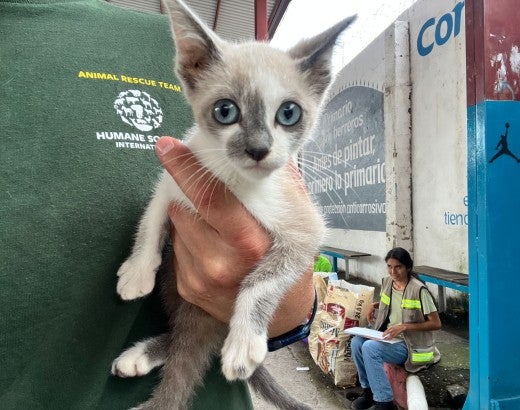Our team in Mexico recently celebrated a massive achievement for animals: The country’s constitution now enshrines animal protection as a fundamental value. This gives the government new authority to legislate on animal welfare issues and will help to bring humane education to schools across the country. In this guest blog, Anton Aguilar, executive director of Humane Society International/Mexico, discusses what this achievement shows about the power of animal advocacy and the hope for a more humane world.
Some milestones feel like the beginning of a brighter future, and this is one of them. Mexico has taken a groundbreaking step by enshrining animal protection as a fundamental value in its constitution. This transformative reform represents years of advocacy and a growing societal commitment to protecting animals from cruelty, neglect and suffering.
This change comes after months of hard work and legislative progress, culminating in approval by 17 state Congresses following earlier unanimous votes by the Senate and the Chamber of Deputies. This reform has amended Articles 3, 4 and 73 of the constitution to embed animal welfare within Mexico's highest legal framework. It is a bold step that promises to reshape how animals are treated across the country and solidify Mexico's position as a global leader in animal protection.
The reform grants Congress new authority to legislate on animal welfare and mandates humane education in schools nationwide. This guarantees that future generations will grow up with a more profound sense of compassion and responsibility toward animals. It also lays the groundwork for a General Animal Welfare Bill, expected to establish national standards for humane treatment and care, encompassing all types of animals under a single bill. We will continue working closely with legislators and the government on policy and implementation.
This constitutional milestone is part of a broader trend of national progress in animal welfare legislation. In 2017, Mexico City's Constitution recognized animals as sentient beings, marking a significant cultural and legal shift. That same year, the federal government criminalized dogfighting—a victory that HSI/Mexico played a central role in securing. In 2021, Mexico became North America's first country to ban cosmetics animal testing. By 2022, Tlaxcala became 31st state to include penalties for animal cruelty in its local criminal code. And just this past month, Oaxaca passed its first statewide animal protection bill, closing a loophole that made it the last state in the country lacking such legislation. That new law sets provisions to prevent and ban animal cruelty and abuse in its various forms; establishes responsible pet ownership as an educational guideline in public schools; and mandates spay-neuter campaigns for companion animals across the state. These gains reflect a growing awareness that empathy and ethics must guide public policy.
At HSI/Mexico, we've had the privilege of contributing to these significant changes. From drafting legislative proposals to training enforcement officials and providing on-the-ground care, we've helped embed humane attitudes toward animals in the fabric of Mexican society. This year, we launched an access-to-care pilot program to improve the welfare of companion animals in rural and low-income households in Aguascalientes, a state in central Mexico. The program includes a mobile clinic for preventive services, training government veterinarians for free sterilization campaigns, and an educational initiative to train teachers on responsible companion animal care. Furthermore, we responded to the devastation caused from coast to coast by hurricanes John in Guerrero State and Milton in the Yucatan, providing veterinary care to over 1,500 animals. Finally, it is worth noting that more than 150 companies in Mexico have committed to stop using caged eggs in their supply chains. HSI/Mexico is facilitating a successful transition to increased welfare and cage-free housing for farm animals by working with corporate buyers, producers and financial institutions.
The recent federal constitutional amendment is a powerful culmination of these efforts, not least because it ensures that animal protection will not be as vulnerable to political shifts or legislative rollbacks. We have advocated for this reform, together with civil society organizations including Igualdad Animal and Movimiento Conciencia, by reaching out to legislators and mobilizing public support through online petitions that gathered tens of thousands of signatures. The new president of Mexico, Dr. Claudia Sheinbaum, announced on her first day in office that she would prioritize passing this bill as one of the 100 top commitments of her administration.
Enshrining animal protection in our constitution represents more than legal progress—it signals a profound ethical shift. Recognizing our shared responsibility in caring for animals and protecting them from harm means they are included in our moral considerations. This victory for animals is also a victory for all Mexicans, reflecting the values of empathy and justice that must define a thriving society.
Anton Aguilar is executive director of Humane Society International/Mexico.



